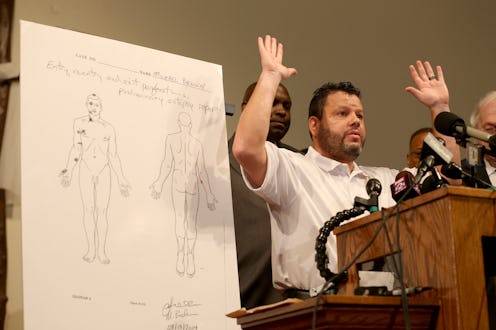News
If Darren Wilson Is Charged, Then What?
Once again, the city of Ferguson, Missouri was racked with late-night chaos Monday, as police fired teargas and deployed LRADs — high-intensity sound cannons, so powerful they can inflict physical pain — amid ongoing protests over the shooting death of 18-year-old Michael Brown. It was Aug. 9 when Ferguson police officer Darren Wilson fatally shot the teen, and the town has been shaken to its core, with many protesters vowing to keep up the struggle until Wilson is charged. But if Darren Wilson is charged, what consequences could he face?
Yes, Wilson being charged for the shooting death of Brown might feel like a kind of justice for the Ferguson protesters, but a true measure of consequence would be a conviction. We're not even there close to being there yet; a grand jury will convene Wednesday to decide whether to bring charges against Wilson. Going forward, here are a few realistic outcomes...
1. The Grand Jury Doesn't Charge Wilson at All
This is the outcome many, many people would be unhappiest with, so let's get it out the way upfront. Wilson might not be charged at all. It's up to the grand jury to decide whether Wilson will stand trial for killing Brown, and they're likely to have access to about as much evidence as is available to make the decision.
According to TIME, they've requested that Wilson testify. As for Wilson, whereabouts are currently unknown, having left Ferguson in the days following the shooting.
If the grand jury doesn't see fit to indict Wilson, there will not be a criminal trial. And with the eyewitness accounts that have already been made public — though more evidence will likely be available to the grand jury — it's fair to predict this outcome would intensify the public outcry, not quell it.
It's also a pretty distinct possibility. As Talking Points Memo details, indictments resulting from police shootings are apparently quite uncommon.
2. A Trial Jury Believes Dorian Johnson/Eyewitness Accounts
Two very different stories are being told about the altercation between Brown and Wilson, and which one a jury ends up believing, and finding more corroboration for, will be pivotal. Multiple eyewitnesses, including Brown's friend Dorian Johnson, have told a pretty consistent story about the shooting.
As detailed by Newsweek, both Johnson and eyewitness Piaget Crenshaw saw a struggle between WIlson and Brown the the window of WIlson's police cruiser, culminating in him firing a shot from inside the vehicle. Brown and Johnson then took off running, and following multiple more shots, Brown turned around to face WIlson and was hit with multiple bullets. An autopsy has subsequently revealed Brown was shot six times from the front, twice in the head.
If this is the version of events that convinces the jury, supported by witnesses and corroborating evidence, then Wilson would be in huge legal trouble. Based on varying interpretations of the incident, which would obviously have to be demonstrated at trial, anything from a murder to manslaughter conviction could be on the table.
3. A Trial Jury Believes Officer Wilson's Account
Thanks to insights shared by a "friend" of Wilson's who called in to conservative radio host Dana Loesch's show, we have a clearer picture of what his side of the story might be, and what his defense may be arguing in a theoretical criminal trial. According to CNN, a relevant source confirmed that the caller's details matched the story which Wilson told investigators.
So, here's what they allege: Brown blocked Wilson from opening his car door, punched him in the face, and reached for his gun. A struggle ensued, and a shot was fired — the "friend" claimed Brown had aimed the gun at Wilson's hip, but it had been pushed away before the shot went off. According to the "friend," Wilson got out of his car to chase Brown and Johnson as the pair ran off, telling them to halt. Brown turned around, began taunting Wilson that he wouldn't shoot him, then rushed back towards him. Wilson began firing, but Brown "just kept coming." Brown fell dead mere feet in front of Wilson.
If the jury sides with this version of events — which doesn't, yet, have any witnesses or evidence to support it, at least none the public yet knows about — then it's Brown's death will probably be found a justifiable homicide, and Wilson will be free.
As that Talking Points Memo piece detailed, justifiable homicide findings are very common in police shootings — when they actually make it to trial. In short, if a grand jury does charge him, there's a fair chance Wilson will escape consequence for Brown's death — beyond, obviously, the consequences it's already had for the people of Ferguson and throughout the nation.
Images: Getty Images (2); WAVY TV 10/YouTube
